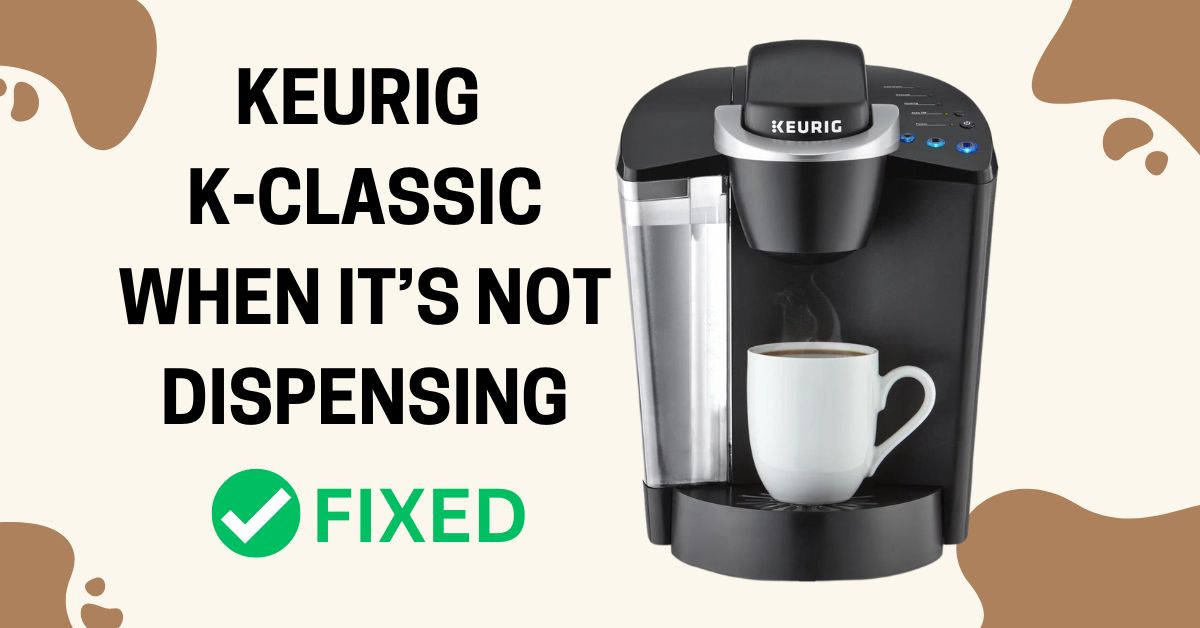A good cup of coffee helps you start your day, but it’s tough to enjoy that perfect cup of joe if your Keurig K-Classic is not dispensing water. There are many reasons why this could happen. Fortunately, there are also ways to troubleshoot and some that are easy to fix yourself.
In this guide, I’ll walk you through several troubleshooting steps that you can take to get your K-Classic pumping properly. So you can enjoy your cup of coffee in the morning again!
Reasons and Fixes For Non-Pumping K-Classic
Luckily, there are many ways to troubleshoot your Keurig coffee maker if it starts dispensing problems. Many of these methods can be done from home, saving time and money on repair bills.
Insufficient Water in Reservoir
If the water reservoir is empty, Keurig will not be able to pump water through the machine. To fix this issue, simply fill the water reservoir with fresh water. Make sure to use cold, fresh water and check the water level in the reservoir before brewing. If the water reservoir is not securely in place, the machine will not function properly. Also, ensure that the water reservoir lid is properly closed.
Misaligned Reservoir
Sometimes the water magnet can get misaligned due to brewing vibrations, so Keurig may not detect how much water is inside the machine and will stop dispensing water.
To align this, tap the tank close to where the magnet is housed. If it doesn’t move, try giving it a little shake. If still no luck, you may need to replace the water reservoir.
Require Descaling
There may be an obstruction in the tube, or it could be clogged with mineral deposits. If this is the case, you can clean out your coffee maker. You should descale your brewer every three to six months. If you use Hard Water (high mineral content water), then you should descale it more frequently. A low-cost test kit can help you determine whether your water is hard.
Descaling is the process of removing mineral buildup that can accumulate inside a coffee maker over time. Minerals such as calcium and magnesium can build up in the water line, the brewing chamber, and other internal parts of the coffee maker, which can cause issues such as reduced water flow, poor-tasting coffee, and even damage to the machine.
Keurig has manufactured its descaling solution that works with all models of Keurig. Make sure you follow the instructions on the package.
Symptoms of a coffee maker that requires descaling include:
- The machine is not pumping water as it should.
- The machine is taking longer to brew a cup of coffee.
- The machine produces weak or poor-tasting coffee.
- The machine is leaking.
Clogged WaterLine
A clogged water line is another common issue preventing K-Classic from pumping water. The water line is the tube that carries water from the reservoir to the brewing chamber. Over time, mineral buildup can clog the water line, preventing water from flowing through.
To fix this issue, you will need to clean the water line.
- Removing and emptying the water tank. Also, remove the water filter holder.
- Flip the reservoir over and locate the nozzle with the spring. Take something like an eraser end of a pencil and try pushing the spring a few times.
If the spring moves easily, that is the problem with the water line.
- Attach the tank back to the machine and fill it with a few inches of water.
- Take Turkey Baster and suck up some water.
- Splash the Baster directly into the nozzle where the tank meets the water line. This will allow you to flush out the water line and nozzle.
- Repeat this several times until the water line runs clear.
After completing this process, running a hot water cycle is important to ensure the water line is cleaned out.
Air Lock In Water Line
Keurig brewer is making a grinding noise, but water is not coming out, so it likely has an airlock in the water line. This is caused due to your machine running a brew cycle with insufficient water in the tank. To clear a possible airlock:
- Unplug your machine and remove any K-cups from it.
- Also, remove the water reservoir and drip tray.
- Take Keurig with both hands and shake it like a rattle. Keep shaking until you notice water flowing out of the bottom.
- Put Keurig back together and try to brew again.
It sounds strange, but rapid movement should eliminate the air bubbles inside water lines.
Clogged In Needles
Over time, Needles can become clogged with coffee grounds or calcium deposits. If this happens, the brewer will stop dispensing water or only dispense a little bit of water at a time.
If you own a Keurig 2.0 model, you can use the orange needle cleaner tool to unclog the needle. If you have a different Keurig model, use a paper clip to remove debris from the needle.
Here’s how to do it:
- Turn off the power to the brewer.
- Remove the water reservoir from your Keurig.
- Eject the pod holder from the machine.
- Take out the funnel from the pod holder.
- Straighten one end of a paper clip and insert it into the bottom of the pod holder. Move it for a few seconds to remove any clogs.
- Rinse the pod holder and funnel with fresh water.
- Take a look at the entrance needle inside the brewer’s head. If you see any coffee grounds or calcium deposits, use a small brush or paper clip to clean them off gently.
- Reattach all the parts back.
- Turn on your Keurig and let it run for a few minutes without brewing anything. This will help clear out any remaining coffee grounds or calcium deposits in the system.
More Advance Issues
After trying all the above troubleshooting tips, if your K-Classic still isn’t dispensing water, there could be a problem with the system itself. If you don’t hear motor noise when running, it may be that the motor is broken. If this is the case, the motor or the whole unit will need to be replaced.
To replace the motor, you want to disassemble the brewer and manually change it. But this is challenging because there is a lot of work to change the motor. Also, the machine warranty will be void when you do this. I recommend you contact Keurig Support for help at 866-901-2739. They will be able to help you troubleshoot the issue and get your Keurig up and running again.


